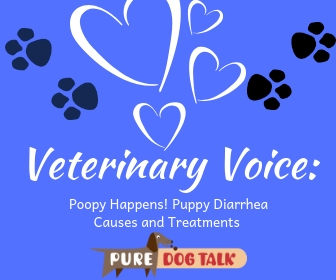328 – Poopy Happens: Puppy Diarrhea Causes and Treatments
Poopy Happens: Puppy Diarrhea Causes and Treatments
Puppy diarrhea can be serious and dangerous due to dehydration risks, says Dr. Marty Greer, DVM. While “poopy happens” is a pretty common issue in a litter of puppies, some causes are more serious than others.
Causes of “bad potty” can range from the benign to the deadly and knowing which is which and how to treat them can be a matter of life and death.
“I can’t believe I ate the WHOLE thing….”
Overeating is pretty common, particularly when puppies transition to solid food during weaning.
“While nursing, the diarrhea is white in color, and the puppy is very hefty,” Greer said. She strongly recommends dog specific probiotics during weaning, particularly Proviable or Fortiflora.
“What do you have in your mouth?!”
Eating inappropriate stuff like rocks, sticks, leaves is another common problem in puppies that can cause stomach upset and loose stools. Since puppies are curious and often investigate their new and expanding world with their mouths, it can also be dangerous! Watch what they pick up and police their areas for hazards.
All kinds of bad bugs
Viral infections such as parvovirus and distemper are life threatening emergencies. Certain breeds don’t titer well to parvo vaccines and these diseases can even be transmitted by raccoons in “latrines.”
Parasites, Greer noted, affect as much as 95 percent of puppies. Worm puppies at 2, 4, 6, 8 weeks if the bitch is not on dewormer *during* pregnancy. Greer recommends a specific protocol of treating the pregnant bitch with fenbendazole daily from the 5th week of pregnancy to the 2nd week of lactation.
“You can worm bitch forever, but parasites will encyst in her muscles,” Greer said. “The stress of pregnancy and lactation reactivates these into her bloodstream. The parasites are then passed through placenta AND milk to the puppies. Puppies that are still nursing, are still receiving the larval form of the parasite through milk.”
Giardia and coccidia are common in puppies. Giardia responds to Panacur. Coccidia responds to Albon.
Cleanliness is next godliness
Bleach is my favorite disinfectant. Visit this site to learn about proper dilution in different scenarios: https://www.aspcapro.org/resource/bleach-dilution-calculator
Treatment
Kaopectate, the human-grade over-the-counter item, has changed the formula and metabolizes as aspirin in the dog, Greer said. She strongly recommends a low-cost and effect solution, the original kaolin-pectin.
And don’t forget to send your puppies home with insurance!!

